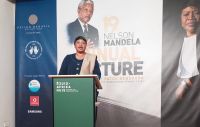
Madame Fatou Bensouda delivers the 19th Nelson Mandela Annual Lecture.
Media statement: 19th Nelson Mandela Annual Lecture
From: Nelson Mandela Foundation
Date of publication: 25 August 2021
Peace and justice must co-exist for both to thrive
Peace and justice must work side by side – and “prioritising one over the other jeopardises the chance of either”. So said former International Criminal Court (ICC) Prosecutor Madame Fatou Bensouda, as she delivered the 19th Nelson Mandela Annual Lecture.
Mme Bensouda delivered her speech virtually from The Hague in the Netherlands, as COVID-19 considerations prevented the Annual Lecture from being presented in person. The online audience was also addressed by Mrs Graça Machel, Professor Njabulo Ndebele and Nelson Mandela Foundation CEO Mr Sello Hatang. And after the Lecture Mme Bensouda engaged in a question-and-answer session with lawyer and activist Ms Lwando Xaso.
Professor Ndebele, Chairperson of the Foundation’s Board of Trustees, provided a robust framing to the 19th Lecture, exploring amongst other things the implications for the rule of law and for constitutionalism of the wave of public violence which rocked South Africa in July. Mrs Machel responded warmly to the Lecture, underlining key points made by Mme Bensouda and encouraging her to keep gracing international stages.
In her lecture, titled “The Rule of Law, International Criminal Justice and Its Contribution to Sustainable Development”, Mme Bensouda noted that Goal 16 of the United Nations Sustainable Development Goals (SDGs) highlights three key elements: peace, justice and strong institutions.
“I remind fellow human rights practitioners how important it is for communities to understand that the promise of peace comes with justice and accountability. I believe this package is a more sustainable recipe for actualising Madiba’s vision of transitional justice; whether through redress or transformation of political and social systems,” she said.
Mme Bensouda posed the key question: To what extent does international criminal justice and the rule of law contribute to sustainable development? And specifically, how can bodies such as the ICC contribute to peace and sustainable development?
Peace
Addressing the first SDG 16 key element of peace, Mme Bensouda said: “It is important for governments – especially democratic governments – to understand that their primary duty is to safeguard the rights of citizens – whether economic, political or social … In principle, any government unable to safeguard these rights has failed to discharge its primary duty.”
To not do so would be to cause people to despair. And: “despair is no ingredient for prosperity; and without hope we cannot actualise or activate peace, especially among increasingly globalised and rapidly developing societies in Africa”. Leaders who “fan the flames of divisiveness” should be held accountable.
Strong institutions
Turning to the need for strong institutions, Mme Bensouda argued that in many places laws are adopted but not implemented: “Oftentimes, the concepts underpinning these laws (such as peace and justice) seem abstract, cliché, and detached from the desperate daily needs of the masses. The power of strong institutions lies in their ability to activate these concepts from theory into practice, through swift and efficient systems.”
People worldwide “need to have faith in the institutions responsible for ensuring justice, in the event of a breakdown in the rule of law”, she stated. In this context, the ICC is the world’s first permanent criminal court “holding accountable those responsible for the commission of crimes of concern to the international community, including genocide, war crimes, crimes against humanity and the crime of aggression”.
Mme Bensouda took issue with arguments that the ICC’s work impedes peace, saying that the Rome Statute – the founding document of the ICC – “demonstrates the clear determination of the international community to put an end to impunity for perpetrators of atrocity crimes that threaten the peace, security and well-being of the world, and, by doing so, to aid in their prevention”.
Justice
Mme Bensouda said that she “believes in the collective power of those championing the global and constant fight against injustice”.
“The causal link between justice and sustainable development is global access to the former without prejudice. The concept of justice conflates the principles of fairness and equity,” she said, adding that “accessibility to forms of redress is a crucial aspect of sustainable development when it comes to justice”.
In conclusion, Mme Bensouda said much work remains to be done: “We MUST pursue peace by upholding the rule of law through strong institutions, and strive towards a more just world.”
She ended her lecture with a question: “What is YOUR contribution to sustainable development? We must remember and uphold our collective and individual roles as active citizens of the globe. How we choose to come together in solidarity, to build systems of accountability that strive towards peace and justice, can truly forge transgenerational impact and sustainable change. As Mandela, the great rock of Qunu, said: ‘It is in your hands to make a difference.’”
During the question-and-answer session, Mme Bensouda was asked by one of the viewers, “What does justice mean to you?” Her immediate response was: “It means everything to me.”
ENDS
Media Enquiries:
Kneo Mokgopa
Manager: Communications & Advocacy
+27 (0) 76 420 1910